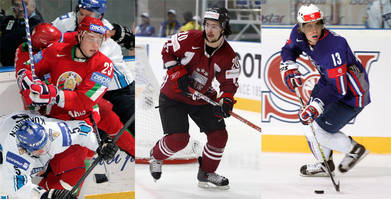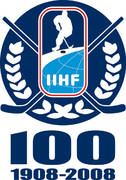Story #42
May 6, 1992 — Prague, Czechoslovakia
It is an often repeated saying that sports and politics should not be mixed. In practice nothing could be further away from reality. Sports and politics have been, are, and will forever be intertwined. Ice hockey and the IIHF were very much affected by the defining moments in modern history, the fall of the Berlin wall on November 9, 1989, and the final dissolution of the Soviet Union on December 26, 1991.
Only five months after Mikhail Gorbachev declared the office of the President of the USSR as extinct and turned the power to Boris Yeltsin, the IIHF held its Annual Congress in Prague, Czechoslovakia. (Ironically, only seven months after that congress also the hosting country seized to exist). As the members of the IIHF highest legislative body convened in the congress room in Prague in the morning of May 6, 1992, the agenda had the following point 7: Admission of new member associations and expulsions.
Nine new countries, who earlier were part of other nations, applied for new membership; Latvia, Estonia, Croatia, Lithuania, Ukraine, Slovenia, Belarus, Kazakhstan and Azerbaijan. Iceland, who of course was not involved in the political developments at the turn of the decade, applied simply as a new member.
There were 32 nations represented at the congress, carrying a total number of 73 votes, which meant that 37 votes were needed for simple majority. As the first congress day was nearing its end, finally point 7 came up on the agenda. There would be no surprises and no split voting. All the applicants were unanimously admitted and the status of observers from the nine applying countries turned in a couple of seconds into official membership. There was a rousing applause welcoming the new members to the hockey family. At the same time the Russian Ice Hockey Federation was installed as member, replacing the former Soviet Union.
So altogether the IIHF lost one member (Soviet Union) and gained eleven new. (As matter of trivia, Kuwait was expelled, due to lack of hockey activity).
Few congress decisions in IIHF history had bigger influence on the international game than this one. It was as huge for the world governing body as the 1967 expansion from six to twelve teams was for the NHL.
Five of the new members (Latvia, Ukraine, Slovenia, Belarus and Kazakhstan) would in a couple of years reach the top division of the IIHF World Championship program and all, with the exception of Slovenia, would soon qualify for the Olympic Winter Games. Latvia forever changed the face of the World Championships thanks to their fans who travel en masse to follow their team, regardless of where they play.
Ten years after becoming an independent hockey nation, Belarus shocked the sporting world by defeating Sweden in the quarterfinal of the 2002 Olympics in Salt Lake City. In the wake of that success, the country has developed stars like brothers Andrei and Sergei Kostitsyn and Mikhail Grabovsky (all playing in the NHL). Slovenia has – despite all odds (the country has only about 100 professional players) – reached the highest level of world competition and will again be in the World Championship in Canada in 2008, probably with sensational forward Anze Kopitar, one of the brightest young stars in the NHL.
The congress decision from 1992 triggered even more nations to take up ice hockey and join the IIHF. In 1991 there were 25 nations competing in the IIHF championship program. In 2007 there were 46.
As part of the IIHF's 100th anniversary celebrations, www.IIHF.com is featuring the 100 top international hockey stories from the past century (1908-2008). Starting now and continuing through the 2008 IIHF World Championships in Canada, we will bring you approximately three stories a week counting down from Number 100 to Number 11.
The Final Top 10 Countdown will be one of the highlights of the IIHF's Centennial Gala Evening in Quebec City on May 17, the day prior to the Gold Medal Game of the 2008 World Championship.
These are the criteria for inclusion on this list: First, the story has to have had a considerable influence on international hockey. Second, it has to have had either a major immediate impact or a long-lasting significance on the game. Third, although it doesn't necessarily have to be about top players, the story does have to pertain to the highest level of play, notably Olympics, World Championships, and the like. The story can be about a single moment — a goal, a great save, a referee's call — or about an historic event of longer duration — a game, series, tournament, or rule change.
|
 |
Click here for the 100 Top Stories
|










